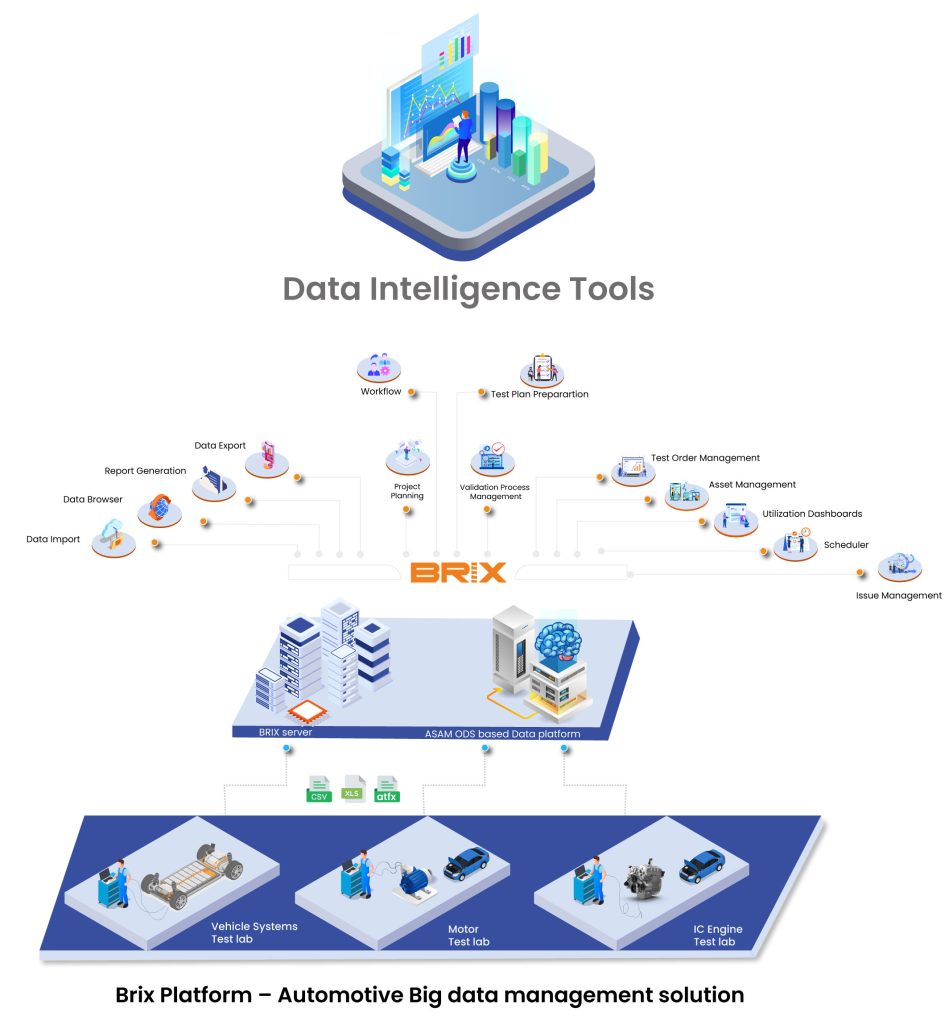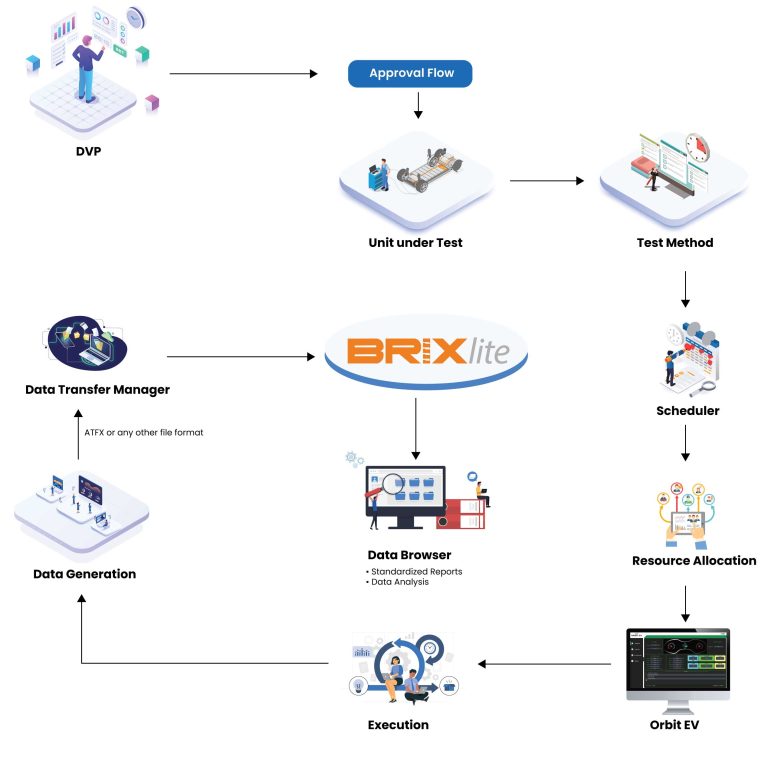Revolutionizing EV Testing Through Test Data Analytics: Unveiling Efficiency and Precision
Electric vehicles (EVs) have become more popular in the automotive market as a result of improvements in battery hardware and technology as well as mechatronic system integration. EVs have been around for a while, but because of developments in battery systems and the use of advanced technology, their market share has dramatically increased.
However, the success of EVs is not solely attributable to hardware improvements, It is the convergence of electrical storage, propulsion systems, electronic sensors, controls, actuators, software integration, secure data transfer, and data analysis that has transformed EVs into comprehensive and reliable transportation solutions. In this modern mechatronic vehicle ecosystem, data analytics plays a central role in vehicle development, acting as the common thread connecting all these elements.
Need of data analytics in EV testing:
During vehicle testing and development, EV OEMs and startups face a prevalent issue of scattered data sources, which demands significant expenditure of time and capital to make it accessible for analysis while ensuring data security. The ongoing difficulty is exacerbated by the growing need to facilitate comparative data study and modify vehicle systems to meet changing industry demands. For startups with sharp constraints of time, resources, and budget, keeping up with renewing standards, compliance norms, and testing processes can be onerous.
Centralization of data storage, smart data management, and comprehensive analytics of test data, can truly empower an organization to grow out of these challenges. With this approach large volumes of testing data can be quickly and accurately analyzed, allowing the identification of patterns and anomalies, crucial area prioritization, testing procedure optimization, efficient resource allocation, and historical analysis comparison by integrating compliance checkpoints, an automotive test data analytics platform can assist OEMs in adhering to changing standards and regulatory requirements.
However, it is crucial to approach this situation strategically and proactively. One potential solution to address the challenges of cost and time associated with installing a completely new E Drive Test Bench system is to consider transforming the existing ICE (Internal Combustion Engine) test bed to an EV motor test bed. This approach offers several advantages, including cost-effectiveness and reduced implementation timelines.
Brix Platform for EV Testing
iASYS is a leading brand in test automation and digital transformation solutions in the automotive industry. With our expertise in the field of testing and validation and decades of experience, we have developed the Brix a web-based solution platform designed to ensure data quality and integrity while generating reliable and insightful reports based on user preferences. Unlike traditional management systems such as Excel or Power BI, Brix offers centralized data management, making it the preferred choice for users who require comprehensive data solutions. Within Brix, there are several applications available, including Brix Lite, which facilitates data management, data restoration, standardizing data formats, and generating reports seamlessly.
Key elements of BRIX Lite to use data intelligence as leverage in EV testing.

Automated Data Collection: The first step is to collect relevant data during EV testing. This includes various types of data such as sensor readings, vehicle parameters, performance metrics, and operational data. the data collection process must be robust, and accurate, and covers all critical aspects of the EV system. For this automated data collection tools like iASYS (ORBIT) can be used.
Data Cleaning and Preparation: Once the data is collected, it needs to be cleaned and prepared for analysis. This step involves removing any outliers or errors, handling missing data, and transforming the data into a suitable format for analysis.
Data Integration: Data integration is the process of combining data from different sources to create a unified dataset for analysis. In many cases, EV testing involves collecting data from multiple sources and from various test bed suppliers irrespective of any test report file format. This step involves aligning timestamps, merging datasets, and ensuring consistency across different data sources.
Insights and Reporting: The final step is to derive actionable insights from the data analysis results and generate reports or visualizations to communicate the findings. These insights can inform decision-making, guide improvements in EV design, and performance optimization, and contribute to overall quality assurance and compliance processes.
Exploratory Data Analysis (EDA): EDA involves analyzing and visualizing the data to gain initial insights. This step helps identify patterns, trends, and relationships within the data. Exploratory visualizations, statistical summaries, and data profiling techniques can be used to understand the characteristics and distribution of the data.
System Application Flow Diagram of Data Intelligence:

The initial stage of the development or test process involves formulating a comprehensive plan. This plan defines the components, test processes, and process roadmap to be followed. Once the development plan is established, the development project is configured accordingly. This step entails defining the necessary stakeholders, project stages, and tentative project lifecycle, laying the groundwork for smooth project execution. The subsequent step is to create a tentative test plan, where approval authorities are assigned and the approval flow is set up.
BRIX lite offers a platform that allows for flexibility in adding and revising test methods as needed. With the test plan in place, test requests are generated for both planned and unplanned tests. Test resources and manpower are arranged based on availability and utility to ensure efficient utilization. A scheduler, integrated with the iASYS (ORBIT) test automation platform, facilitates test execution and data collection.
Once the tests are completed, BRIX Lite streamlines the technical report generation process, providing quick and predefined reports. Additionally, defect and general reports are generated to address any issues identified during testing. Centralized data management offered with BRIX lite ensures important aspects of test datasets are identified, analyzed, and compared with ease. For an overview of the entire testing process, a comprehensive dashboard is available. This dashboard provides a single landing page where all lab and resource data and analytics are accessible, making it a convenient and valuable single source of information.
Benefits of the BRIX Lite in EV testing:
Data-Driven Product validation & verification (PV&V):
BRIX empowers EV manufacturers to cumulate and analyze real-time data optimizing and validating EV system performance, unveiling data patterns and anomalies, and giving manufacturers a competitive edge in developing high-performance EVs.
Real-world Performance Validation:
The data analytics platform supports the validation of automotive systems by offering the flexibility of support to various data analytics tools, optimizing control systems, energy efficiency, and range estimations for reliable real-world performance.
Informed Decision-making:
The insights developed by a data-driven system validation design and development teams take firm and well-informed decisions during the development process thereby sharply improving the competitive edge in the market.
Management system:
The management system encompasses centralized data management, including lab management, issue management, and resource management.
Conclusion
In conclusion, data analytics plays a crucial role in EV testing and validation by enabling informed decision-making, exploratory data analysis (EDA), and automated data collection. At iASYS technology solutions we have developed the BRIX platform which is an innovative test data management platform. With our specialized team’s expertise and decades of experience in the automotive domain, we are dedicated to providing solutions that meet challenging industry demands. Brix empowers validation and facilitates informed decision-making through the utilization of advanced algorithms and statistical techniques.



